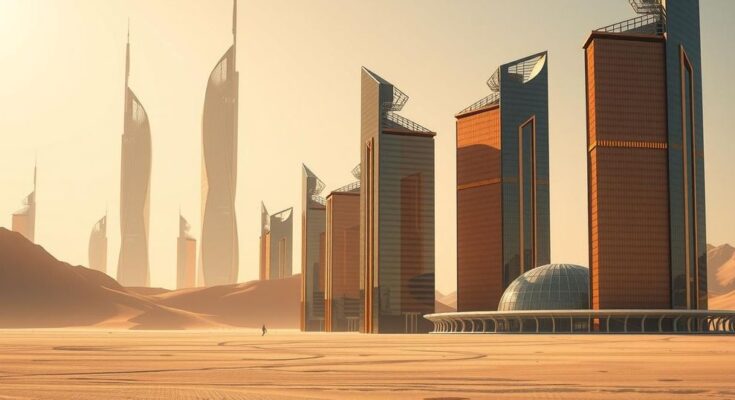Saudi Arabia’s Mirror Line skyscraper project is experiencing severe financial issues, with costs rising to $8.8 trillion, far surpassing the annual budget. An auditor’s report indicated attempts to falsify cost figures. The project, part of the Neom initiative, faces skepticism regarding feasibility as it seeks to transform urban living.
Saudi Arabia’s ambitious plan to construct a colossal skyscraper city, known as the Mirror Line, is encountering severe financial obstacles. Recent reports indicate that the projected costs for the project have soared to approximately $8.8 trillion, a figure that is 25 times higher than the kingdom’s annual budget. This escalation raises substantial doubts regarding the realization of the project, scheduled for completion around 2080.
An auditor’s report has disclosed attempts by officials to manipulate figures, aiming to obscure the inflated costs associated with this colossal endeavor. Initially, the design for the skyscraper intended it to extend 160 kilometers; however, it has now been substantially reduced, with the first section’s length diminishing from 16 kilometers to a mere 2.4 kilometers, prompting concern over the project’s feasibility.
Furthermore, proposals to lower the planned height of the skyscraper as a cost-saving measure have encountered strong resistance from Crown Prince and Prime Minister Mohammed bin Salman Al Saud, who is a fervent supporter of the project’s grand vision. The Mirror Line project represents a critical component of Saudi Arabia’s Neom initiative, which aims to establish a futuristic city designed to foster innovation, technology, and tourism.
The Neom project includes various ambitious developments such as floating cities and zero-emissions infrastructure, though it has met with both enthusiasm and skepticism. While it holds the promise of revolutionizing urban living, the exorbitant costs and significant technical challenges raise serious questions about its sustainability and practical implementation.
In summary, Saudi Arabia’s Mirror Line project is facing critical financial challenges, with costs escalating dramatically to $8.8 trillion. Despite the reduction in scope and concerns regarding feasibility, the project’s future remains crucial to the kingdom’s vision to diversify its economy. Crown Prince Mohammed bin Salman continues to advocate for the grand ambitions of the project, but the financial and environmental implications demand careful scrutiny.
Original Source: www.azernews.az




